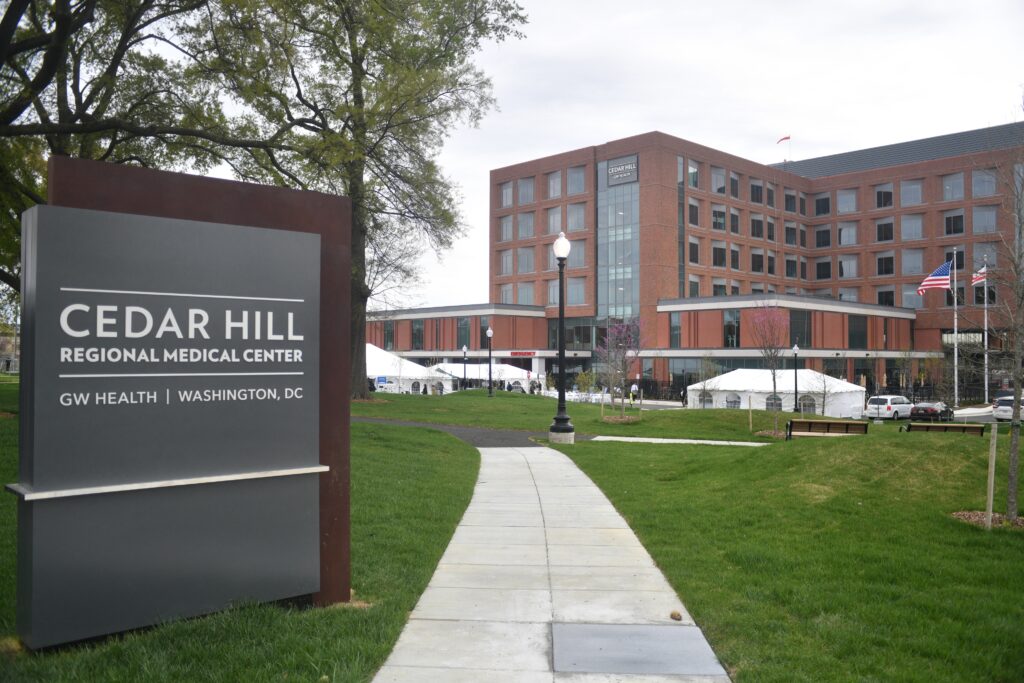When D.C. spent more than $400 million to build its newest hospital, residents were promised prenatal care, outpatient dialysis and family medicine would start shortly after the ribbon cutting in the spring.
A July deadline came and went, forcing residents to continue to trek across the District for the care and leaving part of the 400,000-square-foot facility dark. Now, six months later, hospital officials say they’re finally closer to adding more services by the end of the year.
The hospital could be fully operational by next April — one year after Cedar Hill Regional Medical Center GW Health opened its doors in Southeast Washington.
Although the emergency room was booming on day one and inpatient admissions have steadily increased, outpatient care — the appointments and elective procedures that help keep a hospital financially afloat — have not yet materialized.
The delay stems in part from a long-standing dispute between three parties: George Washington University, doctors at George Washington University Hospital and the Foggy Bottom hospital’s owner, Universal Health Services, which the city tapped to operate Cedar Hill and fill the Congress Heights hospital with doctors.
Cedar Hill leaders have also struggled to staff the hospital with the nurses and technicians who are the backbone of patient care, and lost $50 million while waiting for federal sign-off to bill insurances for care.
But the hospital recently unveiled a rough timeline for adding services: family medicine, obstetrics and postoperative care next month; followed by general surgery in January, then gastroenterology and orthopedics in February, and neurology in March. Everything else, such as cancer care, cardiology and nephrology, will be in April.
The timeline was laid out in a letter from Jason Barrett, chief executive of GW Hospital; Bill Elliott, chief executive of the doctors group GW Medical Faculty Associates; and Ellen M. Granberg, president of George Washington University.
“We collectively share in the disappointment and frustration at the pace of expanding ambulatory services associated with the opening of Cedar Hill this past April,” they said.
The officials were responding to concerns raised by D.C. Council member Christina Henderson (I-At Large), chair of the health committee. The city built and owns the Cedar Hill hospital building, but has limited oversight over hospital operations after officials agreed to a 75-year lease with Universal Health Services, one of the nation’s largest for-profit hospital companies.
“Consider me a hopeful skeptic in Cedar Hill’s ability to deliver on the timeline outlined, especially given their significant hiring challenges,” Henderson said.
The delay in adding the outpatient services has not only cost the hospital revenue, it has also meant residents in medically underserved Wards 7 and 8 do not yet have access to the care they were promised, Henderson said.
Offering care in Southeast Washington will not only save patients a trip across the city, and all the transportation, work and child care challenges that entails for a low-income community, it will also make it possible for residents to experience a full continuum of care from primary care visits to diagnostic tests before conditions become serious.
Patients already sick enough to enter Cedar Hill through the emergency department can then be linked with follow-up care on-site.
Experts say health care access is a critical part of turning around health disparities east of the Anacostia River, where data show the majority-Black population is more likely to die of chronic conditions such as diabetes and heart disease, and life expectancy is about 15 years lower than elsewhere in the District.
Despite some progress, Black pregnant people in D.C. face racial disparities in infant and maternal mortality, making quality empathetic care from conception to postnatal care critical.
Cedar Hill brought back hospital-based labor and delivery services east of the river after an eight-year lapse when the now-closed United Medical Center was ordered to close nursery and delivery rooms, citing medical mistakes.
But mothers can’t yet plan to deliver at Cedar Hill if they want to use the same group of obstetricians or midwives who provided their prenatal care and will handle their postpartum care, including needs from diapers to mental health treatment. Many women in Wards 7 and 8 see providers in Northwest Washington or Maryland during their pregnancies and plan deliveries at MedStar Washington Hospital Center.
Cedar Hill aims to change that by bringing in obstetricians from GW Medical Faculty Associates who currently work at GW Hospital, as well as those unaffiliated with GW who want to serve the community.
Javaka Moore, an obstetrician-gynecologist with a large practice in Prince George’s County, said he plans to see patients at least once a week at Cedar Hill starting as soon as next month.
“When you’re talking about the capital of the richest country that has ever existed, [and] women can’t get basic care, that’s an embarrassment,” Moore said in a phone interview.
Before Cedar Hill can add outpatient services, the hospital must apply for and pass inspections to amend its license through the D.C. Department of Health, which is still possible before the end of the year, said director Ayanna Bennett. As of Tuesday, the hospital had started the application process, a health department spokesman said.
“We’re really happy to see them move forward because a mature hospital, to be financially healthy, does need to have specialty services attached,” she said in an interview.
Cedar Hill opened to much fanfare on April 15. A band played under a white tent and D.C. Mayor Muriel E. Bowser (D), reflecting on the long road to get there, received a standing ovation from hundreds of city officials, community leaders and health care providers.
When city officials selected the owner of GW hospital to operate Cedar Hill, the doctors group GW Medical Faculty Associates was already losing money. The financial woes would grow to losses topping $400 million, prompting a renegotiation of a deal that keeps the Foggy Bottom hospital staffed and faculty teaching at the medical school.
If negotiations are successful, Universal Health Services will create a new doctor’s group that will employ a number of GW Medical Faculty Associates doctors who will serve GW hospital and Cedar Hill, according to a university statement.
Henderson noted the dispute came up at a health committee hearing last December, when then-GW Hospital chief executive Kim Russo assured her that the company would fulfill its obligation to staff Cedar Hill. (Russo announced plans to leave the job days before Cedar Hill opened.)
In the meantime, Barrett, Granberg and Elliott said in the joint letter to Henderson that they are working on what they call a “transitional/interim agreement” for doctors from GW and the region to begin seeing patients at Cedar Hill soon.
Cedar Hill also faced delays after it opened in getting sign offs from the D.C. Department of Health and the Joint Commission, a national accreditation body, necessary before the hospital could bill Medicare or commercial insurance for patient care, according to transcripts of investor calls.
Universal Health Services officials had expected to obtain accreditation as early as July, but it did not come until September or late October, Steve G. Filton, chief financial officer at Universal Health Services, said on a July call. The delays amounted to a loss of at last $50 million, he said.
“The delicate balance that a facility goes through sort of in these early times is we’re not necessarily trying to promote all the surgical elective procedural business that we might otherwise because we’re not necessarily getting paid for it,” Filton said.
D.C. will reimburse Cedar Hill for $5 million in losses, as part of an agreement to cover up to $25 million in the first 10 years, said Wayne Turnage, D.C.’s deputy mayor for health and human services who is one of Bowser’s appointments to the Cedar Hill advisory board.
“They’ve struggled to get sufficient labor to fully run the hospital and to open up outpatient,” he said. “I would have liked to see them be a bit more aggressive in the schedule they laid out … but I understand the struggles they have.”
The post D.C.’s new hospital still isn’t fully open months after patients first arrived
appeared first on Washington Post.



